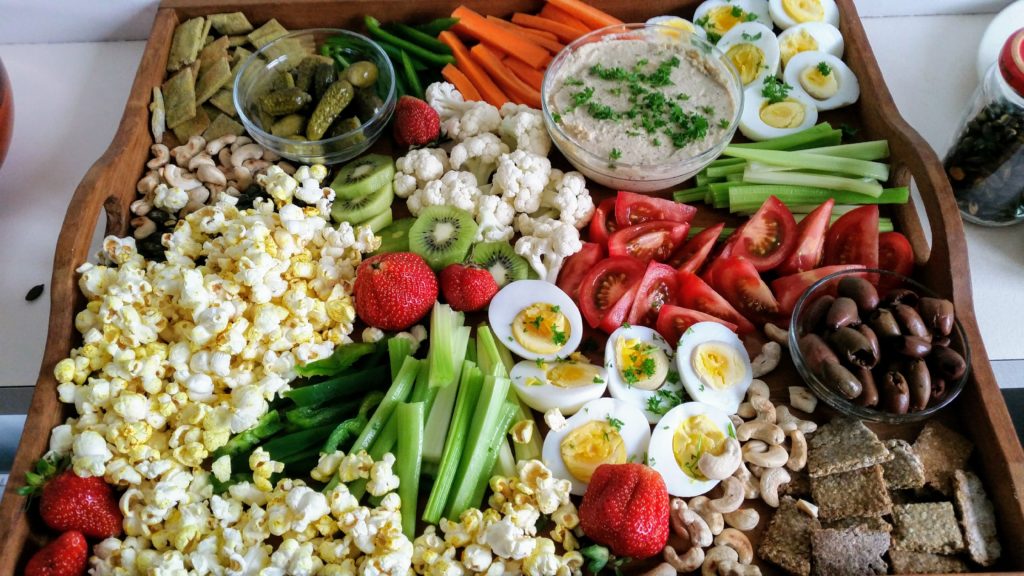Reducing waste was one of my New Year’s resolutions for 2019. As you can see in the photo of each month’s waste in this blog post we were far from ZERO Waste. I don’t see the term Zero Waste as a target though – where you fail if you don’t literally achieve it. I see it more as an ideal or a vision to work towards. A vision of a circular economy where waste is not produced, not buried or burned, where if anything is discarded it becomes a resource for others to use. That’s the dream. And it will take us all at every level to make that happen.
I would have given up before I started if Zero Waste living was about achieving a life completely without waste. As the pic below illustrates, we need all of us to have a go, to do Zero Waste imperfectly, rather than a handful of people doing it perfectly.
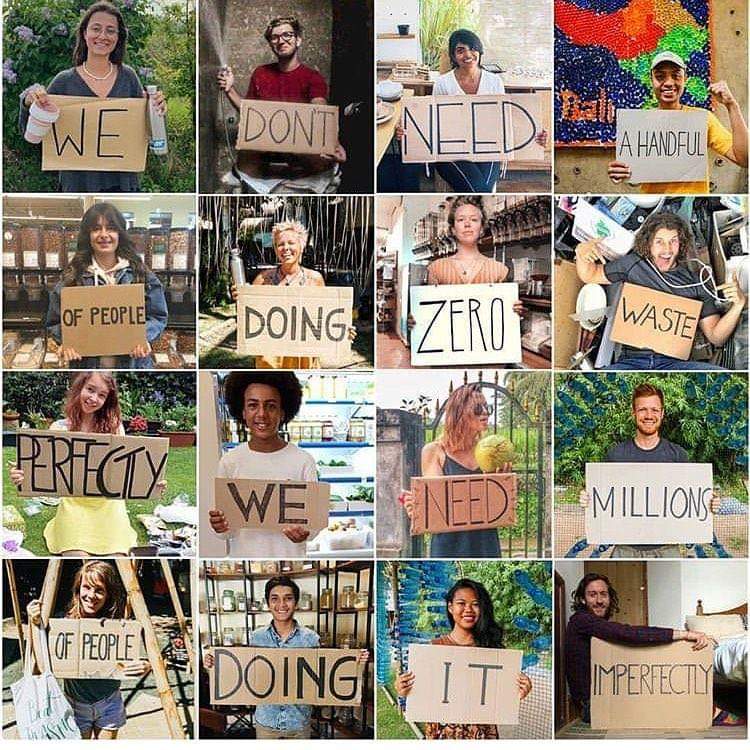
Although literal Zero Waste is unlikely to be achieved, the challenge to minimise waste as much as we can is worth our very best efforts.
For us that’s what 2019 was about.
We are on a journey to reduce our waste and there’s plenty more we could do, but we’re pretty happy with the start we’ve made. We hope our attempts and successes will inspire you to play the minimizing waste game too. 🙂 Seeing it as a game or challenge helps to keep it fun rather than ‘oh no I can’t buy that any more because it’s wrapped in plastic!’ We’ve found it has also saved us money.
What follows are some of the things we have done to minimise our waste. We are hugely indebted to Hannah Blumhardt and Liam Prince of the Rubbish Trip who have shared so many amazing tips, recipes and resources with us through their workshops and talks and on their website. They have inspired and equipped many people around the country including TV presenter Miriama Kamo. Here’s a nice video about her zero waste journey which features Hannah and Liam.
Here’s what we’ve been up to…
BATHROOM
- stopped using shampoo: once every week or two in the shower we make rye flour shampoo with rye flour mixed in the hand with water to make a paste – right pH for the scalp, so less irritation
- stopped using body wash and soap in the shower: wash with water – works fine, better for the skin
- switched from liquid soap in plastic bottles to unpackaged soaps for washing hands
- make our own deodorant from coconut oil, baking soda and tapioca flour: works a treat for Antony but I get red irritated skin if I use it for more than a few days – so I alternate with a Dirty Hippie deo in a glass jar that has no baking soda (not quite as effective as the homemade one, but better on my skin).
- use a menstrual cup. Not actually a change for me, but worth mentioning. I haven’t bought pads or tampons for over 10 years which is such a money savings as well as a packaging/ environmental one and a cup is so much more comfortable than the alternatives. Highly recommend looking into this ladies if you haven’t already.
- made our own toothpaste but didn’t like using it much… bought toothpaste tabs (can find with or without fluoride). We have bamboo toothbrushes (when not using our electric ones) and Antony uses a silk dental floss which is compostable and comes in a glass tube.
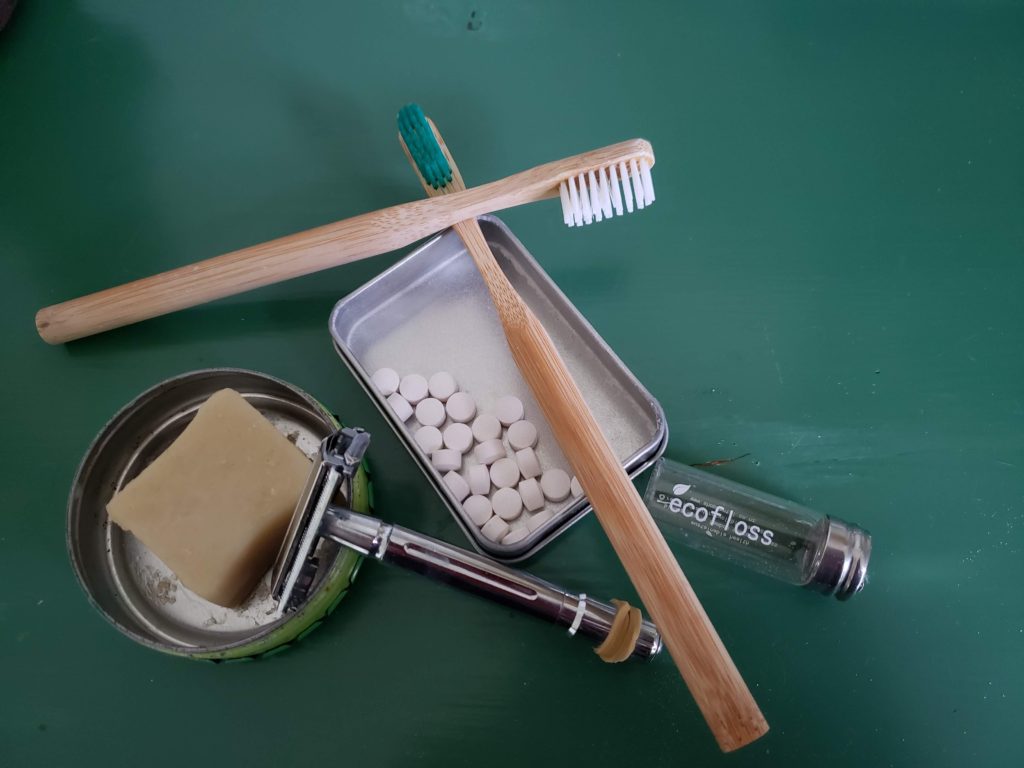
- Antony uses a metal safety razor and also a shave bar (which lasts for ever). I am still going strong with my plastic razor I’ve had for at least 15 years… but the new blades are of course in plastic so I may switch to a safety razor this year sometime.
- Cleaning – we still have our toilet cleaners from the year before so will use them up then I’m not sure if we will replace them or use something else. We use cloths to clean the mirror – don’t need any sprays. If we want to use a cleaning product (anywhere in the house) we use a homemade all-purpose spray, which we made by putting orange peels in vinegar for about 6 weeks I think then strained it and into an existing spray bottle. We get vinegar in our own containers from Bin Inn.
- Still to work on: source unpackaged toilet paper (pity the Rockroll thing didn’t work out 🙁 – it sounded so good!) & look into possibility of installing a composting toilet inside. We aren’t so dedicated that we will use ‘family cloth’ (see video above for explanation!)
KITCHEN
- we buy unpackaged goods from Bin Inn e.g. oats – with the advantage that these are South Island grown Harraways oats rather than Australian like the cheap supermarket ones I used to buy, and peanut butter – where you put the nuts in the machine and out comes peanut butter in your own jar, also popcorn you can scoop up into your own container
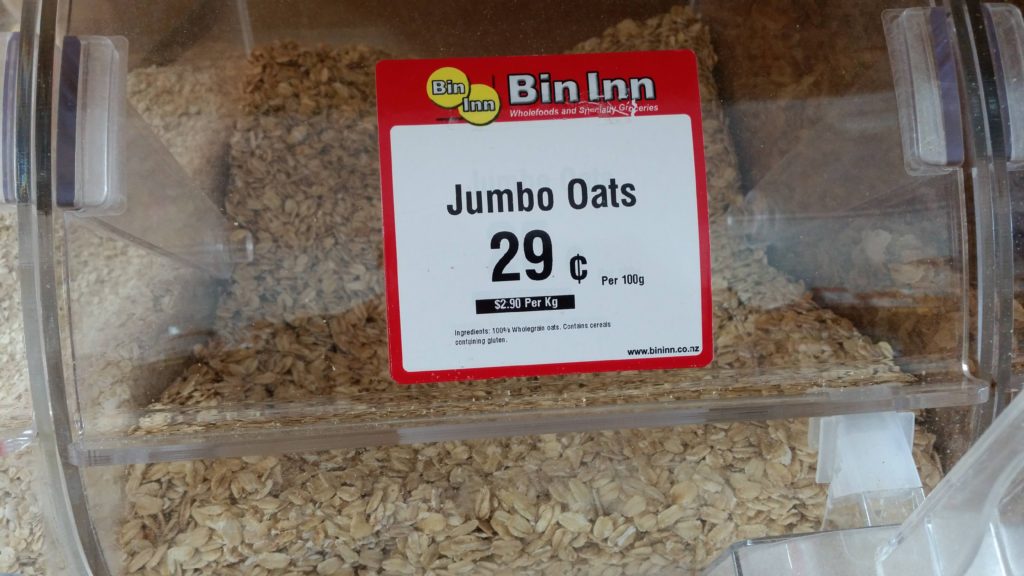
- Piko Organic store, Christchurch: other main supplier for us of unpackaged goods: we take our own bags, containers and bottles to fill up on seeds: NZ pumpkin seeds, sunflower, linseed & sesame, oils: olive, sunflower and sesame, also dried beans, lentils, quinoa and other grains. Some things like polenta and nutritional yeast we have to buy aready packaged, but its minimal, usually brown paper. Although Pikos is organic and you’d expect it to be expensive many of the things are actually cheaper than for the same (non organic) item in Bin Inn.
- Antony does the shopping when he’s in Christchurch for work. There are also timebankers who do Bin Inn runs (now that Ashburton Bin Inn has closed) so they offer to do other people’s shopping while there.
- What we can’t get unpackaged (or if it is just too expensive) we try to buy in bulk from Trents, e.g. almonds, dates, raisins, coconut. The 1kg or 3kg bags they come in are ziplocked so they are good to reuse.
- Fruit and veges: we grow what we can (apples, pears, nashis, grapes, blueberries, strawberries, currants, gooseberries, silverbeet, kale, potatoes, tomatoes, yams, corn, broccoli, cauliflower, zucchini, broad beans, cabbage, rhubarb etc) and what we don’t grow ourselves or when it’s not enough, we buy from the Green Grocer in Tinwald. You can get almost everything there unpackaged, including herbs – like big bunches of parsley or coriander. It’s cheaper and friendlier than the supermarket!
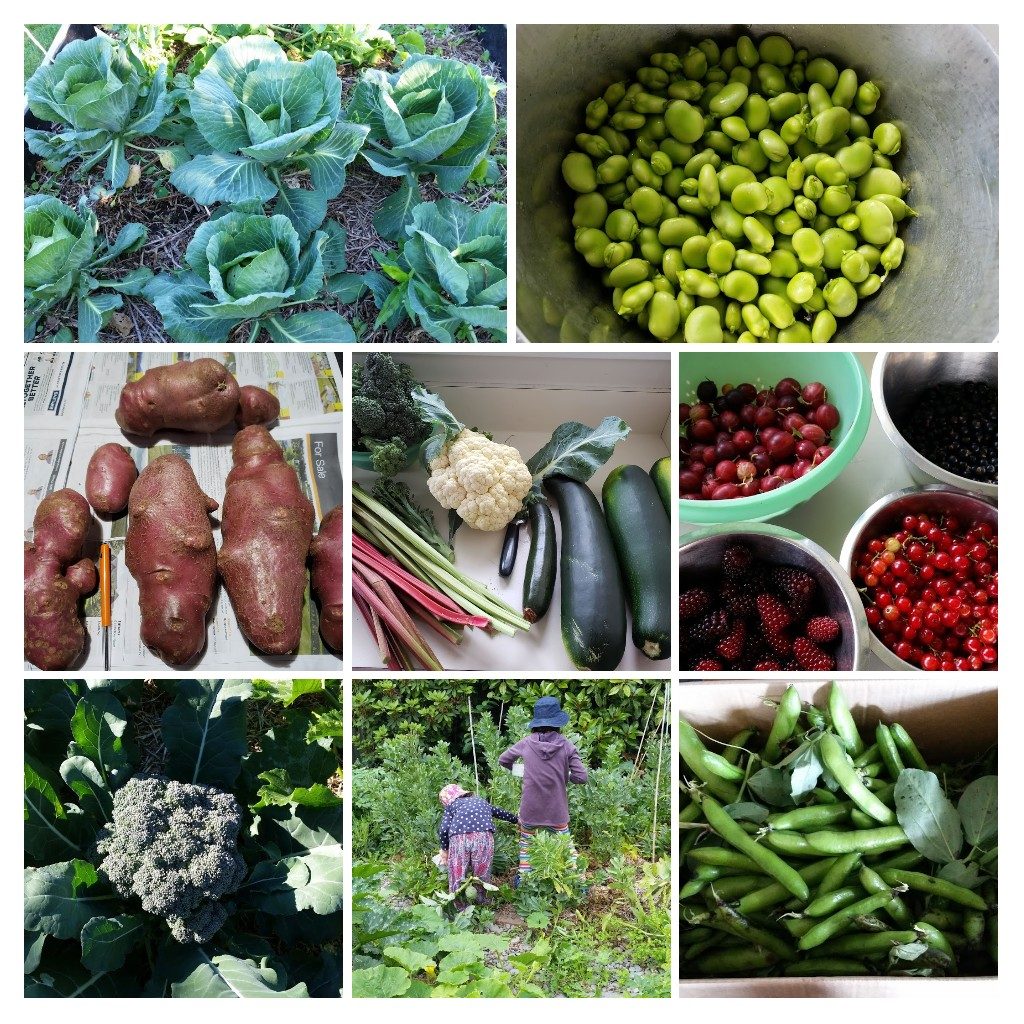
- Preserving and fermenting: Thanks to the help of timebankers I preserved our pears and made up a bottled tomato sauce (to use instead of canned tomatoes) and also lots of zucchini salsa (so good!), pickled cucumbers etc. We used our dehydrator to make zuchini, beetroot and kale chips, and lots of dried apples. I made sauerkraut and kimchi – in jars and then in my new fermenting crock. Kimchi involved some waste as unfortunately some ingredients came packaged from the Asian store… but considering how much it makes, it wasn’t too bad. And it was soooo delicious! It was a welcome addition to lots of meals, and sometimes I just had it as a snack straight out of the jar.
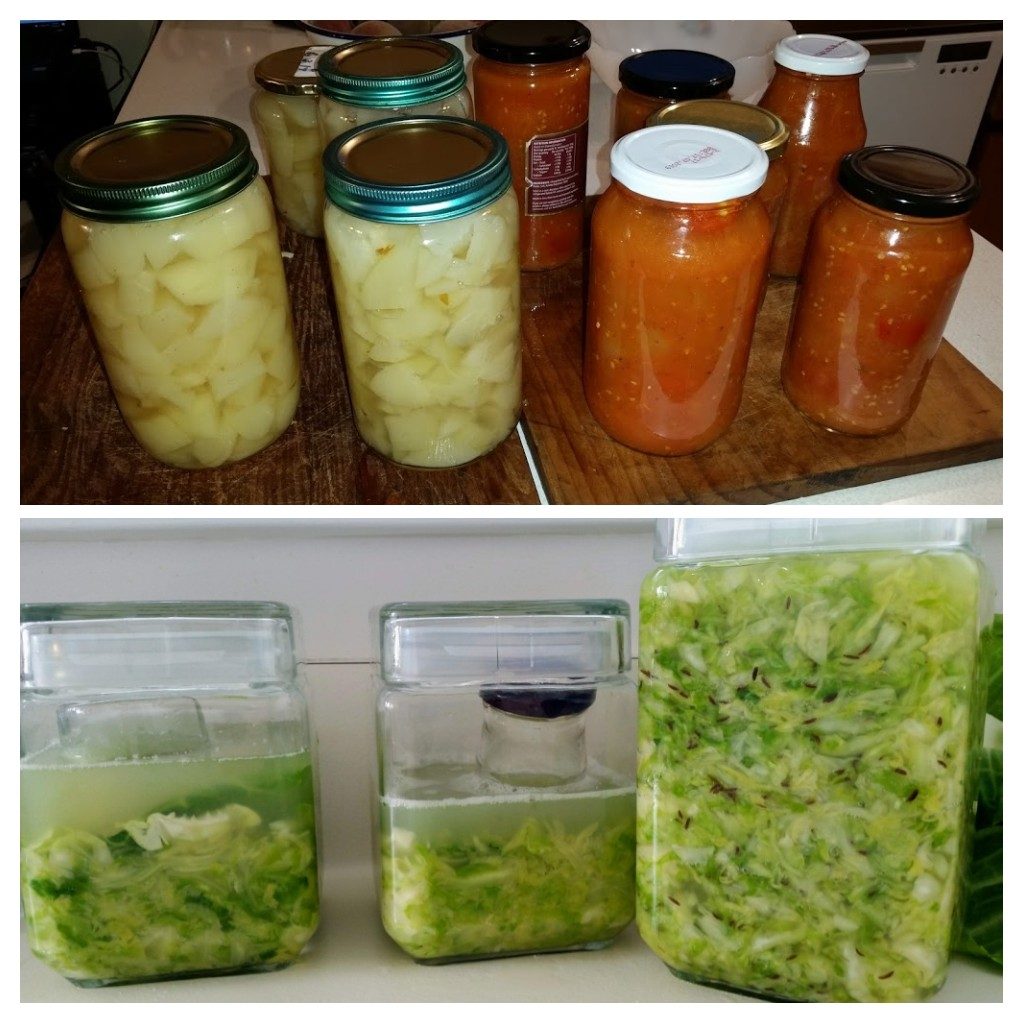
- I hardly go to the supermarket now – only for loo paper, occasional box of tissues (although I’m using handkerchiefs more often), eco planet washing powder, canned tomatoes (didn’t have enough home-grown/ preserved to last the year) and coconut milk (can’t give this up yet!)
- Milk: we haven’t used milk for a long time but used to buy soy or almond milk in tetrapaks which I have learnt are not recyclable. The good news is that it is super easy and cheap to make oat milk… simply by whizzing up oats and water in the ninja, then putting through a strainer. It is a perfect replacement in cooking and baking… not so in hot drinks so we encourage friends to bring milk with them if they are coming over for a cuppa at ours!
- Bread: We don’t eat that much of it (I prefer leftovers for lunch rather than sandwiches). We haven’t bought bread in a plastic bag all year. I make a 6 seed sourdough rye bread which is pretty heavy going that I keep in the freezer. Timebankers make bread for Antony. Occasionally we take our own bags to the supermarket bakery and get bread there. We also make flat breads with either pea flour or buckwheat flour. This is SOO easy it’s ridiculous.
- Chips: the thing I thought hardest to give up has been replaced by other zero waste snacks so yay, haven’t bought any crisps this year, but certainly enjoyed them when available at other people’s places! I did give in to buying 1 bag of nacho chips for a mexican meal… and bought a few bags of chips when Proper Crisps introduced a home compostable bag (yay!). Main replacement for the salty chip craving has been popcorn – bought in bulk, cooked with air in my popcorn maker and topped with oil or melted olivani spread, salt and nutritional yeast or sometimes turmeric. Other replacements have been dry toasted seeds with tamari and homemade crackers… (best discovery of 2020!)
- Crackers: gone are the rice crackers in plastic containers inside foil packets! Thanks largely to the Rubbish Trip recipes, I now keep jars full of pea flour and rosemary crackers (my fave), walnut crackers, oat biscuits (for eating with dips/ hummus) and/or seed crackers. These are all reasonably easy to make and from ingredients I can forage, get unpackaged at Bin Inn or get at the local flour mill in my own bags.
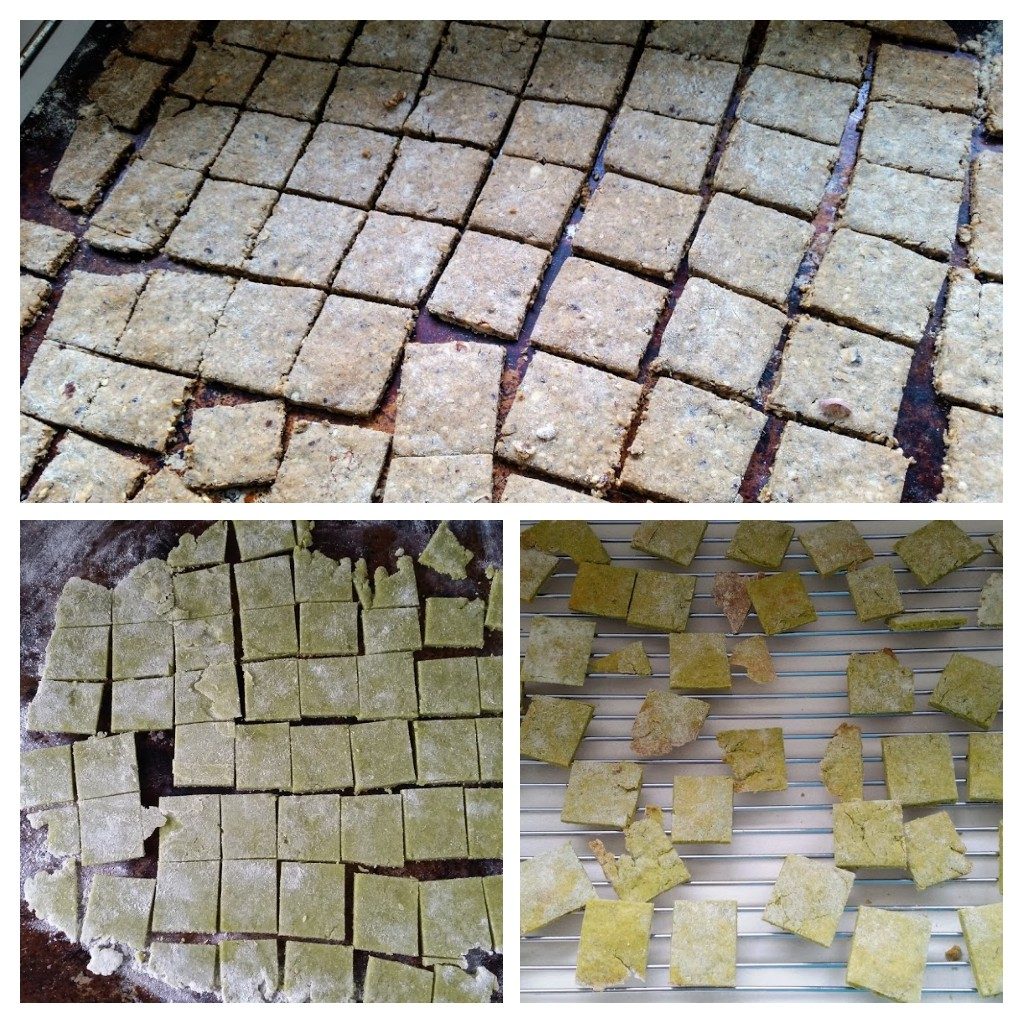
- No more store-bought hummus or dips – it’s easy to make hummus the usual way from dried (unpackaged) chickpeas or in the Rubbish Trip style with soaked sunflower seeds, tomato and smoked paprika. I’ve also made chickweed pesto.
- Most recipes we have can be made without using baking paper or tin foil but we do have supplies of these still that we use sparingly and re-use multiple times before throwing out. We don’t use gladwrap as we generally put leftovers in containers with lids or bowls with a plate on top instead. We have dishes with lids we can use if we are taking food to potlucks. We also have a beeswax wrap but hardly ever use it.
- Drinks: we make our own rhubarb and sometimes elderflower cordial which we put in jars, but mostly we drink water from our tap (we have a filter installed on it) and don’t drink much alcohol. If we have visitors Antony might buy beer in bottles. We make smoothies with greens from the garden, fruit, seeds and water.
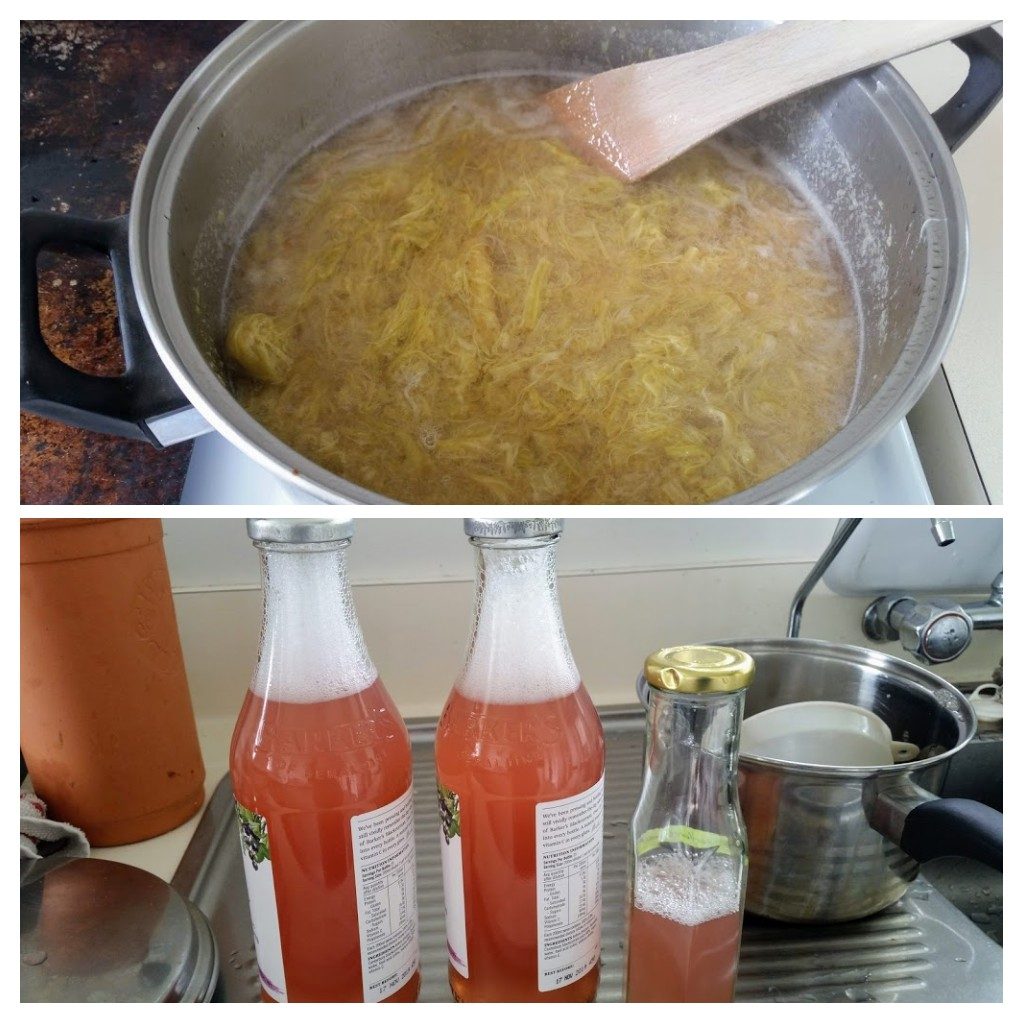
- Crickets & Chickens: we had 3 hens this year which each laid an egg a day almost all year round. So great having a free egg supply at home and chooks who eat our food scraps and turn over our soil for us! We get organic feed for them from a local mill- it comes in large sacks which we don’t think can be re-used but should look into. Antony has a lot of crickets (from when he and a friend farmed them) in the freezer, some dehydrated and whole and others ground down to a powder/ flour. He uses that sometimes in smoothies. These are really the only animal products we use and honey/ sometimes butter for Antony. A friend gets her meat from a local butcher in her own containers so that is possible.
- Sweet treats: instead of buying biscuits or other packaged treats for visitors/ or to take to morning tea shouts, I have made a kind of museli bar from unpackaged ingredients- it is sooo easy (Rubbish Trip recipe) and also zero waste bliss balls and dairy free / avocado choc-mint icecream (YUM!). We buy mostly Fair Trade chocolate in home compostable packaging.
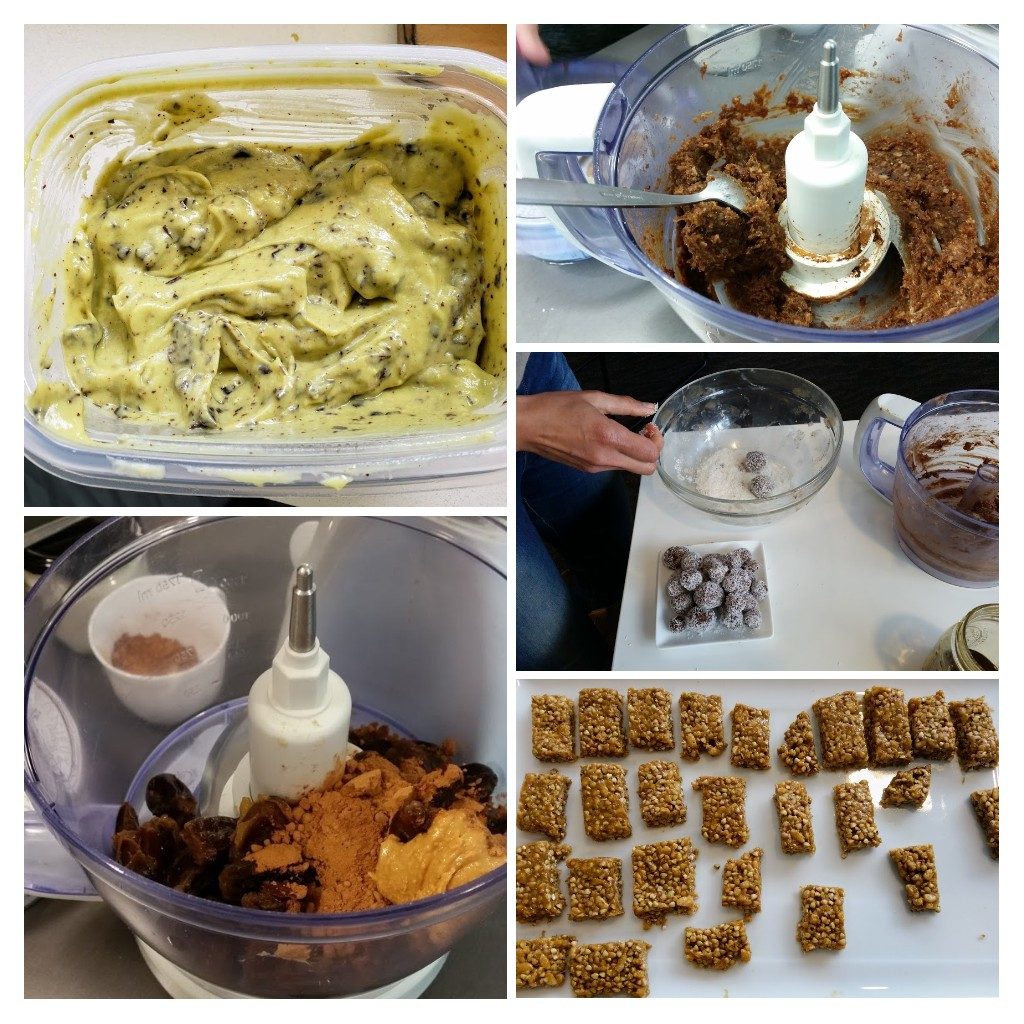
- Dishes/ Cleaning: ecostore dishwash powder is available in bulk at our local Simply Eco refillery in Ashburton, so when ours ran out I bought more there. The dish liquid for the sink we refilled in Christchurch before the Simply Eco refillery was around. We use cloths not paper towels. We currently have a plastic dishbrush which is working great but when it is no longer useable we will replace with a wooden one.
- Food scraps: We have two old plasic containers that live on the bench – one for scraps for the chickens and one for the compost (anything the chickens won’t eat). NO food waste goes into the rubbish bin.
- Take-aways: when we wanted to get take-aways we chose either Dominoes pizza (cardboard into the compost) or fish and chips (burnt or composted the paper) or sushi where you can take your own containers.
- Still to work on: olivani/ butter. I can’t quite live without a spread for the occasional bread I have and most importantly something to melt and pour on the popcorn I regularly consume. Olivani is my spread of choice and the containers are great for freezing things in so at least they get reused a lot. Antony likes real butter and seeing as he has given up on cheese, I feel a bit mean denying him butter! He has no taste for olivani… gotta be real butter!
OTHER THINGS
- We bought stainless steel containers (although I have managed to misplace one set during the year, grr!!) and got a timebanker to make a cloth cutlery holder for us so we can have these in the car/ in a bag when we are out and about and may need to get take-aways. I’ve only used them at sushi and Indian restaurants but they were fine about putting the food in our steel containers. We have cloth napkins, chopsticks and a reuseable cup in the day bag too. We use stainless steel drink bottles daily (Eco Tanka). Again we got these from Simply Eco in Ashburton.
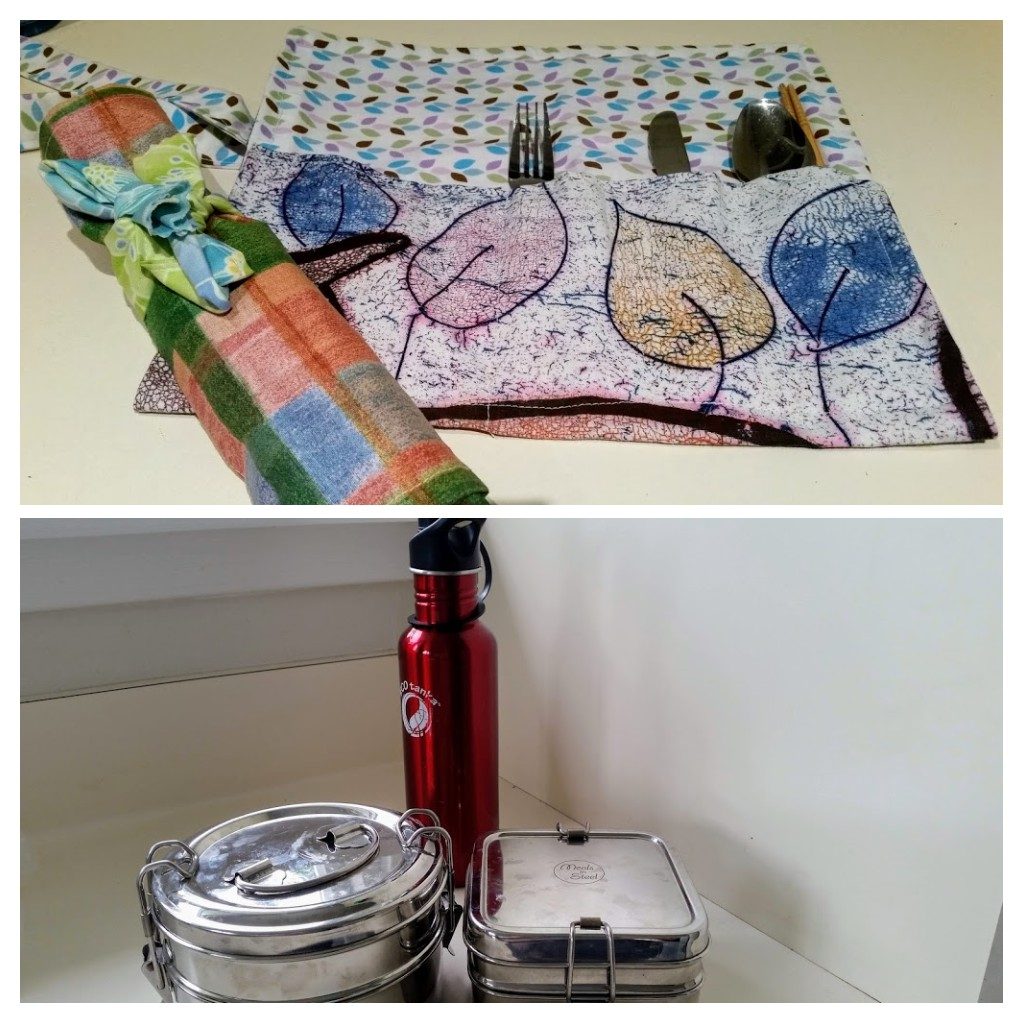
- We still have a rubbish bin in the kitchen (we produce less than half a small bag a month) and recycling boxes in the kitchen cupboards. We have a small bin in the bathroom (for the silk floss – I take out to compost, loo rolls – helps start the fire & foil pill packets – landfill). We have a bin in the bedroom which is exclusively for tissues. These I burn in our fire place when we have the fire going.
- Transport: We try and bike everywhere in Ashburton and only use the car for longer trips. I hate the oil containers we have ended up with for the car (anyone know what to do with these?).
- Clothing: I generally buy all my clothes second-hand from op shops, except for specific sports or travel gear and underwear. I don’t shop unless I need something and Antony almost never shops! When our clothes get holes or worn out we ask timebankers to repair or upcycle them. There are a number of clever and willing sewers in the TimeBank – it’s fantastic! We donate clothes we no longer wear to the op-shop or take to the TimeBank Big Spring Swap. I don’t quite know what to do with clothes that are not worthy of being passed on.
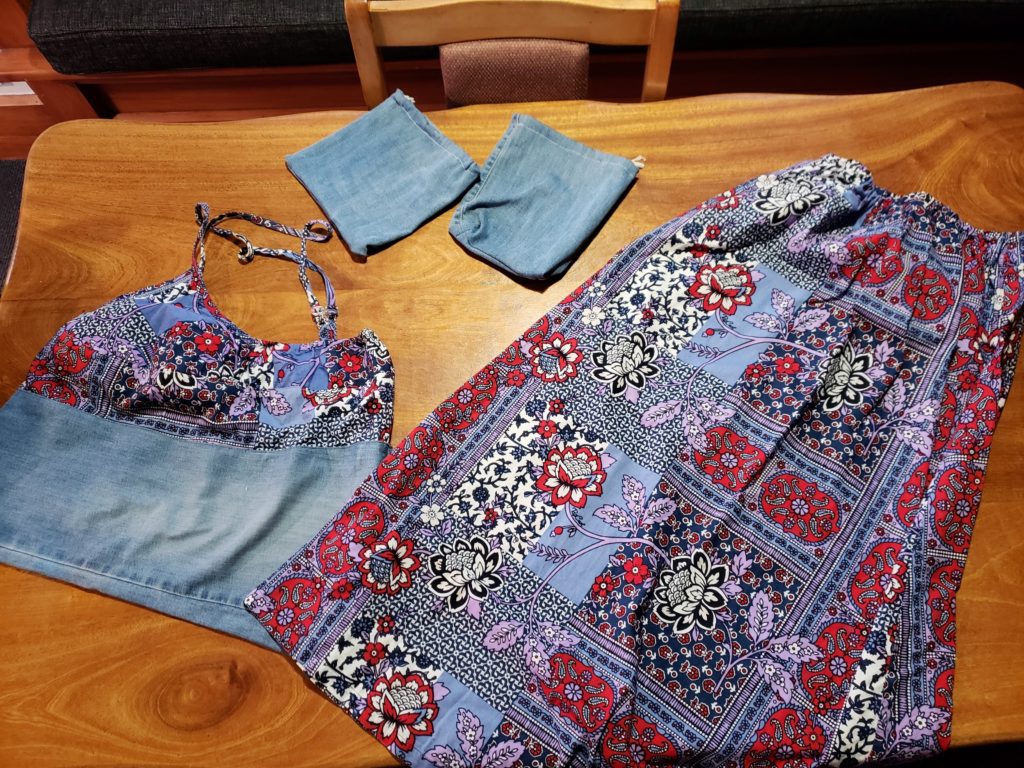
- Reading material: We don’t get a newspaper (aside from the free local weekly paper), and don’t buy magazines or new books. We are happy to use the library and also stock up on second-hand books at the annual Rotary book sale. I want to look into audio-books for 2020. We have a no circulars sign on the letter box so don’t get advertising/ junk mail.
- Hobbies/ Leisure time: We bought a couple of board games or expansions for existing games which have come with some waste (small plastic bags/ wrapping) but again minimal for all the joy gained and times played. We borrow and loan/ share our games among our group of friends so we don’t all have to buy every game. We play golf which has the odd associated waste – score cards (hopefully recycled), golf ball boxes and golf glove packets. Can’t see how to avoid this. I play Bridge and we both like tramping which are luckily zero waste passtimes! Antony has bought some cycling gear online which had a bit of packaging waste but overall our fun stuff is quite low waste.
- Garden: if we buy seedlings from school fairs or the farmer’s market (as I did a year ago), we end up with lots of small black pastic pots. We do seem to acquire more than we can reuse. Ideas welcome for what to do with these! In an ideal world I’d grow things from seed myself but the reality is I’m never so organised and we don’t really have a good set up/ place to do this. We have also bought black plastic this year to line our garden paths after years of constant battles with the weeds and also use black netting to keep the birds off the fruit trees and bushes…. so we are certainly not plastic free.
While we might buy unpackaged things – they are likely packaged in some way to get to the shop we buy them from and no doubt waste is produced in the growing, production and/ or transportation of those goods too.
But just because we can’t be completely zero waste, doesn’t mean we shouldn’t do all we possibly can, does it?
And just because we fail or forget today, doesn’t mean we don’t try tomorrow, right?
